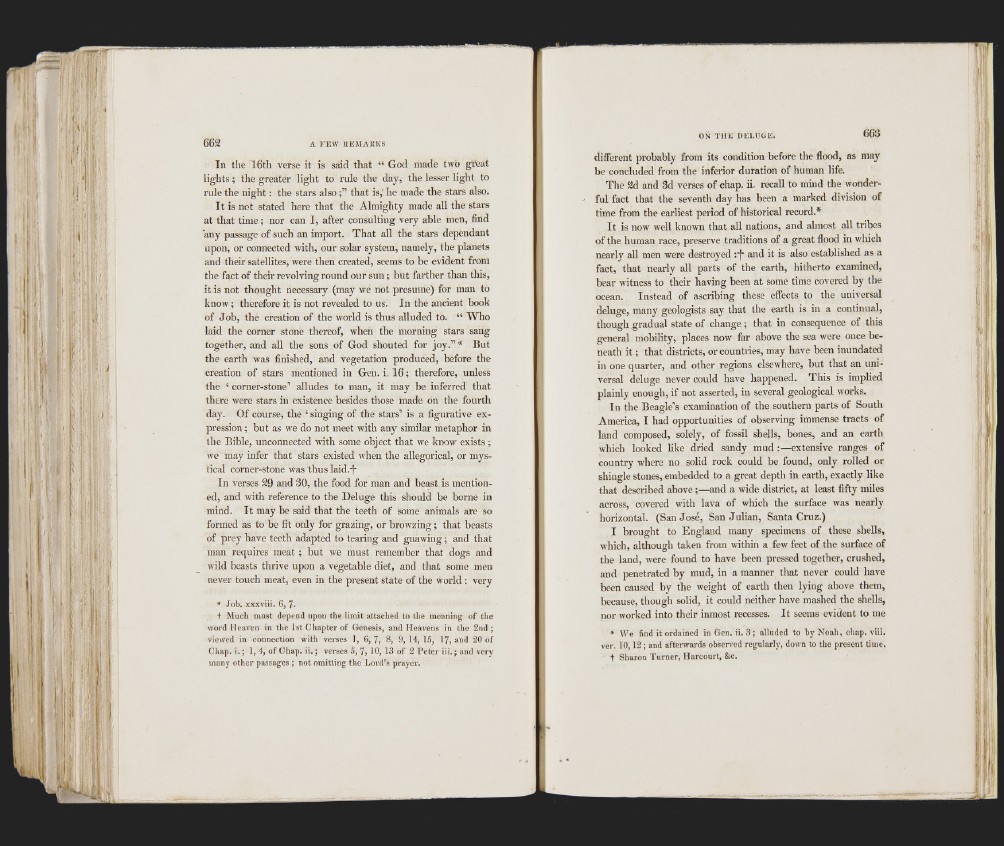
I 1
i i k i l :
f t i -
I
! * »■ !..
i ’ f t
I \
f
.1 i
i.
662 A FEW llEMAKKS
In the 16th verse it is said that “ God made two great
lights; the greater light to rule the day, the lesser light to
rule the n ight: the stars a l s o t h a t is,' he made the stars also.
I t is not stated here that the Almighty made all the stars
at that time; nor can I, after consulting very able men, find
any passage of such an import. That all the stars dependant
upon, or connected with, our solar system, namely, the planets
and their satellites, were then created, seems to be evident from
the fact of their revolving round our sun; but farther than this,
it is not thought necessary (may we not presume) for man to
know ; therefore it is not revealed to us. In the ancient hook
of Job, the creation of the world is thus alluded to. “ Who
laid the corner stone thereof, when the morning stars sang
together, and all the sons of God shouted for joy.” * But
the earth was finished, and vegetation produced, before the
creation of stars mentioned in Gen. i. 16; therefore, unless
the ‘ corner-stone’ alludes to man, it may be inferred that
there were stars in existence besides those made on the fourth
day. Of course, the ‘ singing of the stars’ is a figurative expression
; but as we do not meet with any similar metaphor in
the Bible, unconnected with some object that we ki>3w exists;
we may infer that stars existed when the allegorical, or mystical
corner-stone was thus laid.#
In verses 29 and 30, the food for man and beast is mentioned,
and with reference to the Deluge this should he borne in
mind. I t may be said that the teeth of some animals are so
formed as to be fit only for grazing, or browzing; that beasts
of prey have teeth adapted to tearing and gnawing; and that
man requires meat ; but we must remember that dogs and
wild beasts thrive upon a vegetable diet, and that some men
never touch meat, even in the present state of the world : very
* Job. xxxviii. 6, 7*
t Much must depend upon the limit attached to the meaning' of the
word Heaven in the ist Chapter of Genesis, and Heavens in tlie 2nd;
viewed in connection with verses ], 6, 7, 8, 9, 14, 15, 17, and 20 of
Chap. i . ; 1, 4, of Chap. ii.; verses 5, 7, 10, 13 of 2 Peter iii.; and very
many other passages ; not omitting the Lord’s prayer.
different probably from its condition before the flood, as may
be concluded from the inferior duration of human life.
The 2d and 3d verses of chap. ii. recall to mind the wonderful
fact that the seventh day has been a marked division of
time from the earliest period of historical record.*
I t is now well known that all nations, and almost all tribes
of the human race, preserve traditions of a great flood in which
nearly all men were destroyed :# and it is also established as a
fact, that nearly all parts of the earth, hitherto examined,
bear witness to their having been at some time covered by the
ocean. Instead of ascribing these effects to the universal
deluge, many geologists say that the earth is in a continual,
though gradual state of change; that in consequence of this
general mobility, places now far above the sea were once beneath
it ; that districts, or countries, may have been inundated
in one quarter, and other regions elsewhere, but that an universal
deluge never could have happened. This is implied
plainly enough, if not asserted, in several geological works.
In the Beagle’s examination of the southern parts of South
America, I had opportunities of observing immense tracts of
land composed, solely, of fossil shells, bones, and an earth
which looked like dried sandy mud ;—extensive ranges of
country where no solid rock could be found, only rolled or
shingle stones, embedded to a great depth in earth, exactly like
that described above ;—and a wide district, at least fifty miles
across, covered with lava of which the surface was nearly
horizontal. (San José, San Julian, Santa Cruz.)
I brought to England many specimens of these shells,
which, although taken from within a few feet of the surface of
the land, were found to have been pressed together, crushed,
and penetrated by mud, in a manner that never could have
been caused by the weight of earth then lying above them,
because, though solid, it could neither have mashed the shells,
nor worked into their inmost recesses. It seems evident to me
• We find it ordained in Gen. ii. 3 ; alluded to by Noah, chap. viii.
ver. 10,12 ; and afterwards observed regularly, down to the present time.
t Sharon Turner, Harcourt, &c.
I
I
I